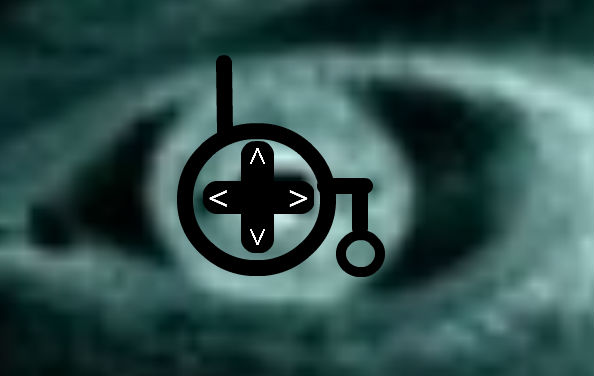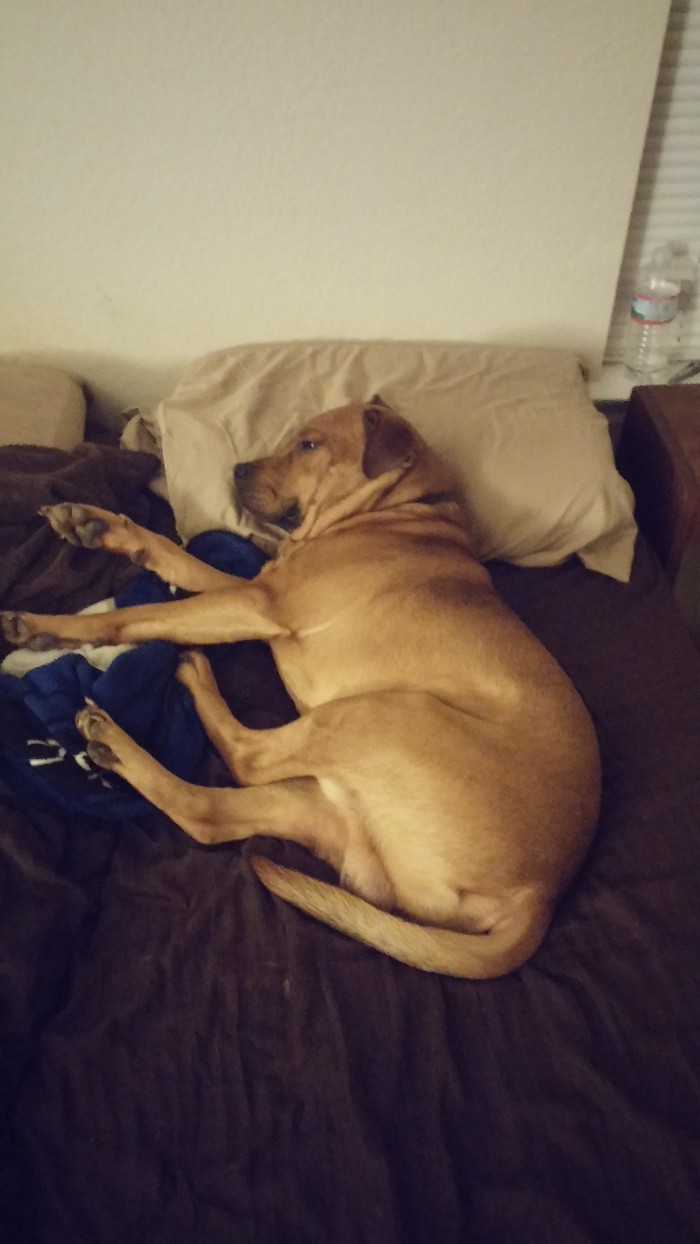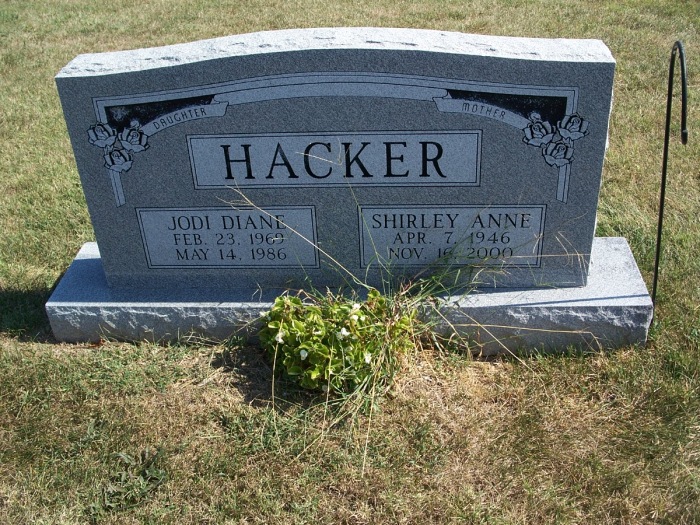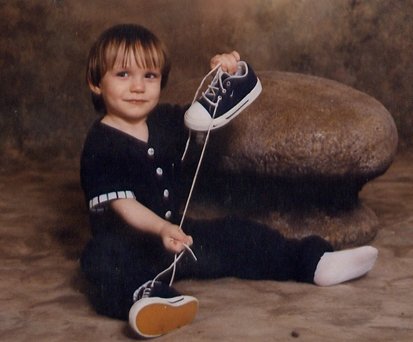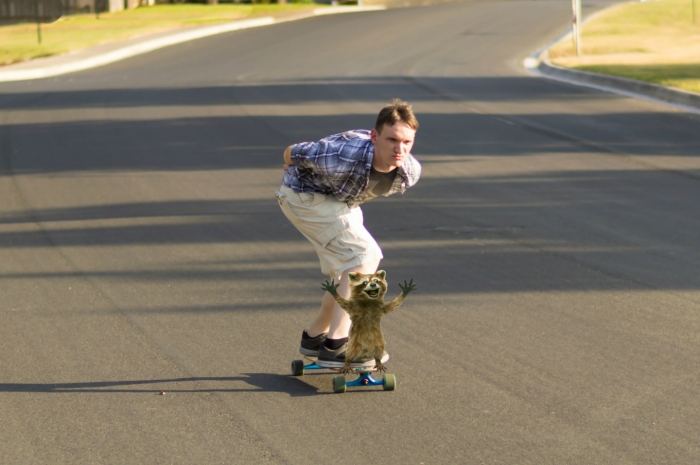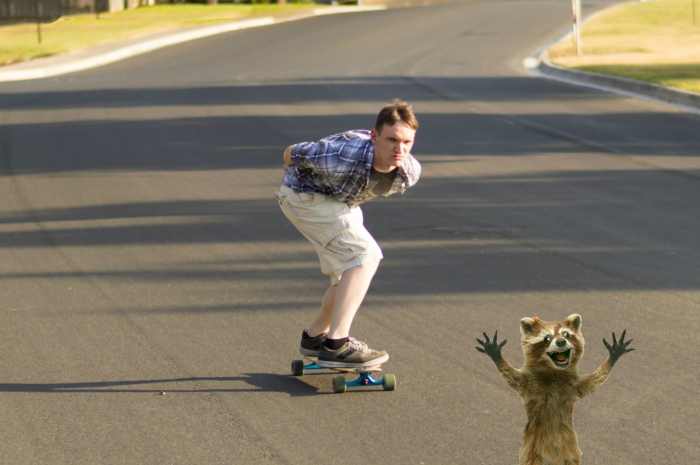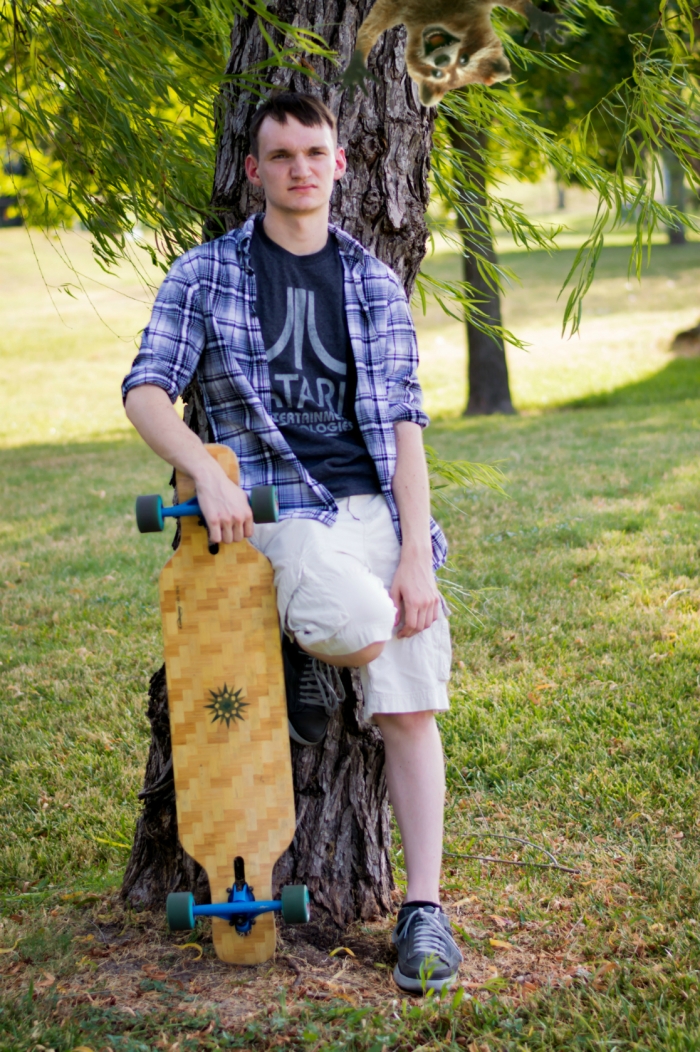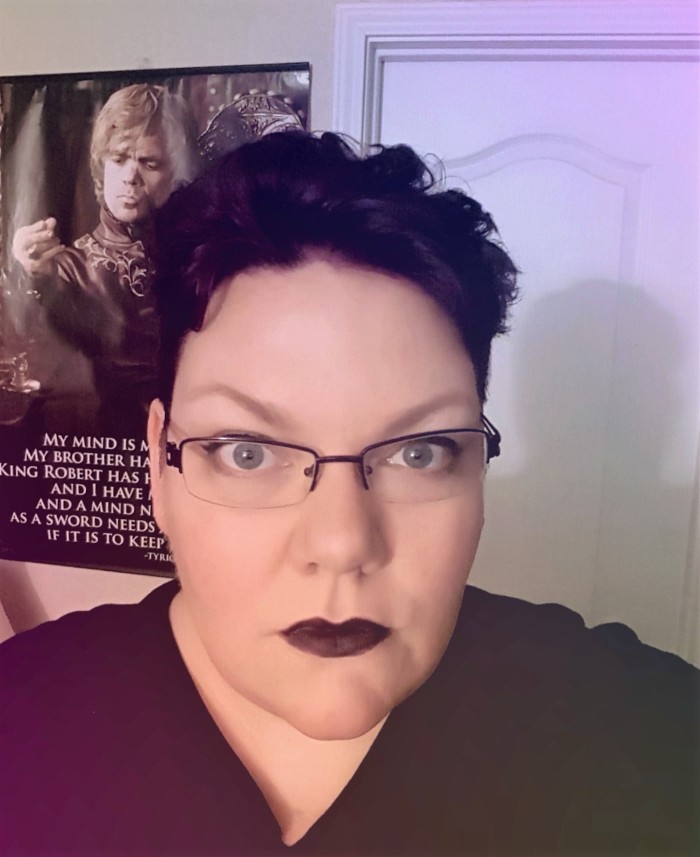TW: abuse (physical and emotional), death, cancer, depression
(The following account does not use any names in order to protect the identities and privacy of family members.)
According to science, there is a very good chance the severity of my (relatively) newly-diagnosed (but not newly begun) chronic illness can be linked to more than just the genetic material handed down by my father. Back in 2009, a major medical study was published confirming that childhood trauma creates a 70%-100% increased risk of developing autoimmune disease. That is a huge increase. I’m a bit late in the game talking about this, though, seeing as how doctors – as a whole – are not talking about this with their patients. I know if any of mine had in the five years I’d been searching for a cause for my symptoms, maybe they would have taken me more seriously and diagnosed me before my Psoriatic Arthritis went haywire in my body and completely destroyed my spine, soft tissues at several major joints, and led to severe peripheral neuropathy.
Maybe if my doctors had asked me what life was like growing up, they would have gotten a clue before then. My father was an alcoholic with a habit of both physical and emotional abuse. One of my earliest memories is sitting down at the dinner table and my father yelling and cursing at all of us (my mother, my older sister, my older brother, and me) for some imagined infraction or another. Having no filter between what I was thinking and what came out of my mouth, I said, “Daddy, you’re drunk.” If my mother hadn’t positioned herself between his fists and my tiny (I was not yet in Kindergarten) body, I would have gotten much worse than being slammed into a wall. But more horrible than the physical punishment I received was hearing my mother take the beating that was meant for me. I tried to control my mouth better after that.
Beyond my father’s physical abuse was the stresses created by my sister’s illness. She was the eldest child, and at 8 years my senior, and 5 years older than my brother, she often acted as our second mother. Yes, we squabbled as any siblings do, but when it all came down to it, we loved her fiercely just as much as we loved our mother. She was the eternal optimist in the family, whispering to us that things would get better, that our father would be leaving again soon on one of his business trips, he would only be home for a little while longer, then things could get back to “normal.”
But normal never came. She started finding bruises all over her legs, when she didn’t run into anything that would have caused such a thing. She was tired and run down all the time, too weak to even lift her flute to play – something she used to do for hours on end a day. She was very musically talented. She got sick all the time, couldn’t seem to shake the simplest cold. After months of doctor visits and tests, she got a diagnosis – Leukemia.
This was back in the 1980’s, before so many of the standard treatments in use today had been even thought of, much less approved. At the time, we lived in Oklahoma, in a tiny town more than an hour away from Tulsa. Medical care for a type of cancer for which there were few treatment options in that area was non-existent. For months, she was in and out of hospitals, getting blood transfusions, IVs of whatever they could think of to throw at it, but she just kept getting sicker and sicker. She stopped being able to go to high school. She wasn’t able to participate in anything she used to love. At six years old, I had the first discussion where it was acknowledged that she could die. My other mother could die. Thankfully, my sister’s condition galvanized my mother to divorce my father, citing his abuse. Unthankfully, at that time the courts didn’t care about enforcing child support. My father would pack up and move to a new state each time my mother finally tracked down an address and work place for him (the courts insisted my mother had to do the legwork herself, then report the information to the court). He was making six figures a year as a mainframe computer programmer; he could afford to keep moving as much as he wanted. My mother was working part-time as a mail carrier, around all the hours she had to be available to take my sister to doctor appointments and hospital admissions. We moved to a tiny house that was infested with mice, but it was still much happier for not being around my father.
After several months passed with my sister’s health declining, her doctors told my mother that there was nothing else they could do for her. If we wanted her to have a chance to survive, we would have to seek out one of the hospitals doing an experimental treatment called a bone-marrow transplant, where the bone marrow of a donor with a genetic make-up very similar to my sister’s would be implanted in my sister’s bones in the hopes that it would multiply and “fix” the problems causing the Leukemia. She would have to have massive doses of chemotherapy and radiation to basically wipe out her own bone marrow so that the donor’s marrow would have a chance to take over. Yes, this is a standard treatment now, but 30 years ago, it was still very risky and experimental. My sister’s doctors thought this was her only hope.
At that time, there were only four hospitals in the U.S. participating in the experiment. My mother had been born in Kentucky, and a university hospital in the state was one of the hospitals participating, so that is where we went. My maternal grandmother and several extended family members, so my mom hoped that they would be able to provide help with taking care of my brother and me while Mom was at the hospital with my sister. It was also discussed that – before we left Oklahoma – we would have to have all immediate family members tested to see if any of our bone marrow compositions were compatible with my sister’s. They would do the sampling (a simple DNA test that looked for certain markers) in Tulsa and send them overnight to the hospital for the tests to be run. It was a given that we all would willingly be tested, and my brother and I – although we were both under 10 at the time – were both adamant that we would do anything to help our sister. There was only one family member who was recalcitrant and put up a fuss about being tested, although in public he played SuperDad.
My parents were tested first; neither was a close enough match. They had been warned this may be the case. The closest match usually comes from a full sibling, as we all were a product of the same gene pools. They then proceeded with the second stage, testing me and my brother.
When the results came back, it was a good news-bad news type situation. The good news was, one of us was an almost 100% match – extremely rare in siblings that are not twins. The bad news was, it was me, the baby of the family. I got the feeling that my brother was upset that he couldn’t do something tangible to help my sister. As the middle child, looking back I can see that he got pushed aside and lost in everything a lot during this time and later, when things went all to hell. I wish I had been older, and more able to understand what was happening with him, and how he was being affected by everything. But because I was young and had my own worries and fears to deal with, I didn’t see it as it was happening. Everyone’s focus was on me and my sister, and how to get her well again.
We made the decision to move to Kentucky that winter (1984/1985). Unfortunately, this coincided with one of the coldest, harshest winters in decades. My father went up there first and moved into an RV in a little town just north of Lexington. Because we were trying to save every bit of money we could, and had little ability to do otherwise, we moved in with him – despite his alcoholism and temper. There were five people living in an RV smaller than most bedrooms. Then the record-breaking snowfall came, and my father’s temper became shorter and shorter, eventually leading to yet another incident where my mother had to stand between my father’s fury and her children’s bodies. We went and stayed with my grandmother for several weeks after that, though that situation was not ideal, either.
Eventually, we were able to rent a house. My mother secured part-time employment as a mail carrier again, my sister began consultations with the doctors at the hospital, and my brother and I started school – me, second grade, and him, fifth. We were already oddballs because we were starting more than halfway through the year. Add to that a touch of Oklahoma accents, a small town where everyone knows everyone, and an ingrained suspicion of strangers, and you could say our schooling was a bit stressful at first.
After extensive testing and consultations, the doctors at the hospital said that they could take my sister as a patient. But there was a problem with our insurance. My dad was USAF retired, so we all had his medical insurance. But since my sister’s treatment was experimental, the insurance company would not cover it. The hospital refused to start any treatment without a down payment of over $100,000. My mother was a part-time mail carrier, and my father kept leaving the state to avoid paying child support. We didn’t have that kind of money. But if my sister had any chance of survival, we had to have that treatment. My mother swallowed her pride and went public, asking for permission from local businesses to put up collection cans with my sister’s story and picture on them around town. Then we got the media involved, asking them to cover my sister’s story on the news.
Many people were supportive, but we also got a lot of hate mail, people calling in to radio stations and writing letters to the news stations calling us freeloaders. The news stories explained about the insurance and the hospital, but many just didn’t believe it. My brother and I got a lot of crap at school from other kids, too, who were repeating nasty things they overheard their parents say. My brother came home from school several times with signs he had been in scuffles. I had my share of trips to the principal’s office for retaliation against students who had said mean things to me.
Finally, we had enough money for treatment to begin. My sister began the early stages of treatment and testing. She was admitted to the hospital for an extended stay – up to a year or more. Mom struggled to be at both the hospital with my sister and at home with me and my brother. Mom had to go on leave from work, and the bills began to pile up. We were faced with eviction from our house, and my father still wouldn’t pay his child support. Over the telephone he told her, “if you marry me again, I’ll pay for everything. If you don’t, you and those little bastards can die for all I care.” Ah, paternal love. Ain’t nothing like it. Backed into a corner, my mother gave in.
They remarried, my dad paid all the bills, then took off to take a job in another state, where he continued efforts to raise funds for my sister’s continuing treatment. While there, he put back on his SuperDad mask, pretending to be the concerned, dutiful dad; in reality, he was anything but. My sister was given a brief reprieve from the hospital, allowed to go out to eat in a restaurant one last time before they would begin the task of suppressing her immune system, making her a prisoner in not only the hospital itself, but her room. She wanted to go somewhere to eat with fresh vegetables and healthy choices. My brother and I both came down with strep-throat, and my mom was afraid of being around my sister and getting her sick. (If she got sick, her treatment would have to be pushed back further.) So, my father came to town for the weekend and took her out to eat. Without even considering why she wanted to eat at the particular restaurant, my father said “No.” See, that particular restaurant didn’t serve beer. My dad was such a lousy drunk that he couldn’t wait an hour for a damn drink so his daughter could have a healthy, fresh, last meal before being trapped in a hospital room. Instead, he dragged her to a bar and grill that served greasy, disgusting food and was full of cigarette smoke. It was the last meal my sister ever ate in public. But that isn’t even the worst of it. One of the side effects of my sister’s condition was that her blood wasn’t clotting very well. My father knew this. It was so bad, she was told not to shave because a nick with a razor could be life threatening. My sister dared to try to tell my dad she didn’t want to eat in the bar so he reached over in the car AND PUNCHED HER IN THE FACE. She could bleed to death from the smallest cut, and his need for beer was so great that he risked killing his daughter over a f#cking drink. My mother found out about this after the fact, and tried to press charges, but my father made up some story that my sister tripped and fell on her way into the bar, but was so mad at him for taking her there that she made up the punch to “punish” him. The police believed him. His SuperDad mask was back in place, and the cops there saw what he wanted them to see – an upstanding computer programmer who put up with the histrionics of his sick daughter and overbearing wife.
Life continued on, but everything changed. My sister had to be in the hospital for months before my role as donor could even start. Her immune system and blood cells had to be suppressed down to an almost non-existent level even for the transplant to take place. After a while, we couldn’t visit her unless we suited up in head-to-toe plastic gear to keep us from contaminating her room with any germs brought from outside. I was kept away from the hospital because I had to stay healthy in my role as donor. I had to eat specially calculated diets to try to boost my own immune system, so my bone marrow would be nice and robust for my sister. I was poked and prodded so many times with blood tests that I developed a severe fear of needles. My anxiety about the actual transplant rose higher and higher, triggering the insomnia I had already been battling since I was a baby. Mom took me to see hypnotists, therapists, anything she could think of to lessen my anxiety. But the thought of not donating never crossed my mind. It got into my mind that my sole reason for existing was to save my sister.
There was one last test before we could proceed with the transplant. The doctors had to extract a sample of my bone marrow and test it on my sister to see how her body reacted to it. Even though I was only 9 years old at the time, they would harvest a sample with only a local anesthetic. They claimed I wouldn’t be able to feel anything. The day came, and my mother escorted me to the surgery suite. The nurse walked in with a huge syringe that looked like it was designed for elephants, not people. The needle on the end of it made me want to faint. It had a very large bore and was extremely long. It had to be strong and long enough to punch through my hip bone and down into the middle where the bone marrow was produced. They gave me the local anesthetic, waited five minutes, and assumed it would have taken effect. I lay facedown on the gurney, my backside uncovered from below my cheeks to my lower back. The doctor climbed up on the gurney and straddled me so he could get enough leverage to punch through the bone. My mother stood to one side and held my hand. Everyone assumed it was okay to proceed. As the needle came down into the bone, it became apparent to me that a local anesthetic was NOT enough. I screamed and my hand spasmed around my mother’s. I felt the bones in her hand grind together, I gripped it so hard. I almost blacked out from the pain. My mother was whispering, “he almost has it, just hold on.” Then, just as he removed the needle and turned to hand it to a nurse so he could climb down, the unthinkable happened. The nurse bobbled the syringe, and it slipped out of her hands and dropped to the ground. The syringe cracked, and leaked my marrow all over the floor. The doctor said, “Shit, we have to do it again.” Despite the fact that it was obvious the local did not work, the doctor ordered a new syringe, climbed right back up, and did it again on my other hip. I screamed again, the bones in my mother’s hands ground together and this time gave a little pop!, then I was being forced to sit up to move to a wheelchair to be moved to another room. My hips are on fire, my vision is sparkly and dimming around the edges, I just fractured a bone in my mother’s hand, I am nine years old, but sure, let me hop right up and jump into the wheelchair for you, Doc.
Later that night, my mother apologized for my experience, but encouraged me to see it as one more step in getting my sister well. Then she said that, should my sister’s body accept the bone marrow the way expected, at least the actual transplant would be done under complete sedation. I would be asleep during the whole thing. It was little comfort at the time.
Soon after that, my mother started watching me with a strange look on her face – despair, resignation, worry, and hope all mixed together. I assumed it was because of my sister’s upcoming transplant and Mom’s worry over how I was handling things. More than a decade later I discovered it was because the doctors had pulled my mother into a meeting to discuss the “medical curiosity” of having two daughters, born 8 years apart, with nearly identical genetic make-ups. Furthermore, my sister and I shared physical characteristics commonly found in identical twins – birthmarks, moles, distinctive tooth placement, etc., in exactly the same place, just in mirror image on each other. My sister had a beauty mark on her right cheek right on the highest point of the cheekbone; I had the exact same beauty mark in the exact same place, just on my left cheek on the highest point of the cheekbone. She had a canine tooth that was positioned in front of all her other teeth on the top right hand side of her mouth; I had the exact same thing on the left side of my mouth. My sister had a small mole on the left side of her nose; I had the same mole in the same place on the right side of my nose. We both had double nails on our pinky toes. Our face structure and build was markedly similar, except where my sister’s hair was dark, mine was a very light brown. Where her eyes were a deep chocolate brown, mine were very light, changing from blue/green/gray depending on my mood. Although those two last items are not commonly found in twins, it just goes to emphasize how I was the photo-negative of my sister is almost every way. The doctors brought all this up to warn my mother. They told her there was no cause for Leukemia that had been found yet; they worried that since our genetic make-up was so freakishly similar for non-twin siblings, my mother should watch me in the years to come for signs of developing it. I was nine at the time; my sister developed her Leukemia at around age 14. The doctors were concerned that – although my immune system was robust at the time – the situation could deteriorate at I aged.
Of course, I knew none of this. I just thought my mom was starting to doubt if I would be able to save my sister. I thought she doubted if I was strong enough after my reaction to the bone marrow sampling. My doubts grew as the transplant had to be rescheduled several times because I had gotten sick at school; I had to be 100% healthy and fever free to be able to donate, or else it could fail.
Although I was scared, I was also relieved when the day for the transplant came. I could finally get it over with. My sister had been receiving donations of stuffed animals at the hospital, but she couldn’t have them unless they were sterilized first. The sterilization process often ruined the fur, so she often had the nurses and staff distribute the gifts to the other kids in the children’s wing who didn’t have to go through such drastic measures to receive a gift. She made sure the kids with few visitors and few decorations in their rooms got the biggest, fluffiest ones. She kept one out, though, and had the nurses deliver it to me in my hospital room a floor below her the day I arrived for the transplant. She knew I was terrified and I wanted me to have some comfort. It had to sterilized before it came to me so I didn’t get sick at the last second, but somehow this little stuffed dog survived the process. I named her Ginger. Thirty years later, Ginger still sits in a place of honor on a shelf beside my bed.
It was so like my sister to do things like that. She always thought about the kids on her floor and had the nurses tell her how they were doing. She always put herself last, celebrated their successes, mourned their losses.
Ginger rolled into surgery with me for the transplant. I was only nine, after all. Even though I was being asked to exhibit adult bravery, I was still a little girl who needed something soft to hug when frightened. After my last experience of having bone marrow extracted, there was much to fear in my mind. I remember the anesthesia mask coming down over my face, being instructed to count backwards from 100, then darkness. Hours later I woke up feeling as though my hips were being stabbed with a white hot poker. They extracted the bone marrow exactly where the two little dimples are in the lower back right above the butt cheeks. To this day I have round scars in the exact center of each one. That is also where my pain begins and radiates up and down in a burning path when I have been standing or walking to long. I am not convinced this is a coincidence.
In addition to the severe pain, I found the doctors had taped and bandaged Ginger in the same way as I was, as though she had also donated bone marrow. While part of me appreciated their attempt to provide comfort for a little girl, another part of me was downright pissed that they put tape on this precious gift my sister took time and consideration from her own sick room to send down to me. I pulled off all the tape and bandages right there in the recovery room, careful not to accidentally remove any of her fur in the process.
I had more pain in my pelvis than the doctors had anticipated. The next day, when the doctors were ready to discharge me, I couldn’t stand up, much less walk, because of the pain. It was like the nerves from the transplant site downward were on fire, and it was short-circuiting my body’s ability to transmit the signal to walk. My mother was with my sister, who had endured a much longer and more grueling process than had I. My grandmother was asked to stay at home with my brother, and my father was tasked with picking me up from the hospital. I dreaded what that meant.
It was hospital policy that all patients had to be wheeled out, usually by a nurse. My father sweet talked her into letting him roll me down because he didn’t want to “bother” her when he knew she was “so busy.” My father was a charismatic man, able to hide his true self from other people, especially women. I wanted to beg her not to do it, knowing in my heart how he felt about any perceived weakness, but he wouldn’t leave her alone with me for even a second. Helpless, I watched her simper out of the room as she told me how “lucky” I was to have a father like him.
The minute she was gone, he started berating me for being a weakling. He wanted to try to make me walk out of the hospital, but he knew he wouldn’t get away with it because of the policy. He picked me up and shoved me roughly in the chair. Then he grabbed the bag with my few toiletries and extra clothes in it and crammed it into my lap. I reached for Ginger, but he held her out of my reach, threatening to rip her head off if I so much as thought about causing “trouble” for him.
All too quickly, we were at his car, which he had parked out of direct sight from the main doors. He opened the passenger door, turned to me in the wheelchair and grabbed me roughly by the upper arms and jerked me up to a standing position before I had a chance to brace myself. My vision went dim and I got lightheaded. He pivoted and used one arm to shove me roughly toward the car. I fell into the car more than got in, because I wasn’t quite close enough to get in without having to take a step; my feet and legs still were not obeying all signals sent by my brain to walk.
He left the wheelchair on the sidewalk and got in the driver’s side. I looked down and noticed an open beer can in a koozy in the driver’s side cup holder. Several empties rattled in the back floorboard. Suddenly I was terrified that we wouldn’t make it home in one piece. But like most drunks, my father was damn good at hiding what he was from other people. Even though we passed several police cars on the half hour trip from the hospital to home, we were not pulled over. I wish we had been.
When we got home, my father started to yell at me and drag me out of the car. That’s when our neighbor and my mom’s new friend from down the street stepped up to deliver a casserole for dinner. Suddenly, my father was the affable, loving father again. He swooped me up so tenderly into his arms, like he was carrying a precious princess into the house. Of course, the neighbors couldn’t see the way he was digging his hard fingers into my ribcage, or the bruises that lingered there for days afterward.
After the neighbors came inside and dropped off the food, my father used my recent experience at the hospital as an excuse to get them to leave. He strode to a bedroom with an attached bath and dumped me roughly on the bed. “Forget about asking for help to use the bathroom,” he snarled. “Suck it up and walk like a normal person, crawl in there, or piss yourself,” he said. He stalked out and slammed the bedroom door. At this point, I was exhausted from the whole experience and was just grateful he left so I could go to sleep. I tucked Ginger in my arms, got as comfortable as I could on the bed and fell asleep.
Sometime later I was awakened by someone pulling me roughly to my feet and dropping me on the floor. “It’s dinner time. If you want food, get off your ass and get in the dining room to eat. No one’s buying your act here,” my father thundered at me. My legs still weren’t working properly. I didn’t eat dinner. I laid in the floor until my mother came home from the hospital to take a shower. She found me there and helped me to my room.
Thankfully, my father had to leave to go back to the state where he job was. We all were grateful. By this point, I hated him with a white-hot rage. I returned to school, but was still having trouble with walking. My elementary school was three stories, and my classes were on the top floor, except for recess, lunch, and two subjects that were all downstairs. There was a clinic on the top floor where I would lie down on a cot while my classmates trouped up and down the stairs. It took several weeks for me to be able to walk as before without pain and weakness. It was assumed the doctors hit some nerves when doing the transplant, which caused prolonged issues.
Despite the transplant, my sister didn’t seem to improve. Her skin took on a dark, jaundiced color. My brother and I went with our mother to visit our sister as often as the doctors would let us. Sometimes, she would be so sick by the time we got there that we wouldn’t be allowed to go in to see her, though. My brother and I would hang out at the nurse’s station or in the children’s play area on those days. I was in advanced classes in school, and somehow it came up that I was interested in computers. We had been learning a lot about programming. The nurses let us “play” on the computers at the nurse’s station, not realizing my brother and I were both advanced enough with computers that we could actually get into the system. I got into patient records and started looking up my sister’s blood work. Remember, I was only 9, so even though I was advanced for my age, there was a lot in the reports I didn’t understand. But I memorized what it said her white blood cell and red blood cell counts were, because I remembered my mother telling me those numbers could tell us how she was doing. Every night when we left, I dutifully reported the worsening numbers to my mother. It took several times before the nurses caught on to what I was doing and blocked us from using the computers.
By then, the damage had already been done. I knew my sister was getting sicker and sicker. My mother didn’t really talk about it with us. She just asked for the numbers, and her face would get pale and grim when we told her. I began to think my bone marrow was killing my sister. With the logic of a child, I reasoned that she took a turn for the worse after she had the transplant. She received my bone marrow. Ergo, my bone marrow must be killing her. I kept this knowledge to myself, though. I was afraid my mom and brother would stop loving me if they, too, figured out that my bone marrow wasn’t good enough and I was killing her with it. I didn’t want them to stop loving me, I didn’t want it to be true, so I said nothing, even as I became more and more convinced I was an evil, terrible person.
This feeling was not helped by my father’s comments to me over the phone and in person when he came to visit. The more he drank, the louder he would say “the wrong daughter got sick” and “Why couldn’t you be the one dying?” to me, the beer making his words slur together.
Not long after one of his visits, my grandmother, brother and I were sitting in our living room, watching TV. Mom had gone to the hospital early that morning to visit my sister. I wasn’t really paying attention to the TV, I was thinking about my sister, and hoping she would get better. Suddenly, I heard her name spoken on the TV. A news bulletin came over the air. “BREAKING NEWS: We have just learned from ______________ hospital that ______ ___________, who recently underwent an experimental bone marrow transplant to try to cure her Leukemia, died at _______ a.m. this morning.”
In an instant, the world went from color to black and white, it splintered into a million different pieces. I felt like I could see the shards spinning and falling into space. Then everything went dark and cold.
Fragment – my mother coming in the door weeping. Granny told her what we heard on the news. My mother cursing them for not having the decency to wait until she could tell us herself before a nurse called the TV station to report the news.
*darkness/cold*
Fragment – Mom hugging me, telling my brother and me that our sister died because her liver failed. It seems she contracted Hepatitis C from a blood transfusion way back when we lived in Oklahoma. They didn’t used to screen for it. It had been hiding in plain sight for years. But I knew that it was the bone marrow. I had seen the reports. I saw the numbers. I killed her.
*darkness/cold*
Fragment – at my sister’s funeral, the rent-a-preacher can’t even say our last name right. He kept going on and on about what a sweet soul she was, bungling our last name in a different way each time he said it. Something in me snapped and I loudly corrected him in the middle of the service.
*darkness/cold*
Somehow years have gone by, we’ve moved, I’m in a new school, and I don’t really remember any of it. Apparently, shortly after my sister died, my mother divorced my father – again. Mom, my brother, and I lived in the house that had been bought because it met the requirements needed if my sister ever came home from the hospital.
*darkness/cold*
I wake up one morning, and I feel fully present for the first time in years. I’m almost 12 now. We’ve moved again, and I’m starting middle school. In the divorce agreement, my father pressed for visitation, but since he lives out of state, he only gets us for a few weeks in summer and a week after Christmas. I dread those visits. He treats my brother like crap, calling him names and trying to “toughen” him up. When he’s drunk, he continues to tell me the wrong sister died. I believe him. In fact, I often wonder why I am still alive. I wonder why anyone should care about me – the freak who murdered her sister.
When drunk, which was often, my father delighted in rubbing my face in the fact that my bone marrow wasn’t good enough to save her. That there was nothing about me that was good, right, or pure, and that even though I looked an awful lot like my sister, I was just a cheap duplicate that didn’t have an ounce of her worth. He told me all I would ever be good for was shacking up with some man. The best I could hope for was someone would want to f*ck me enough to take me off my family’s hands.
Yet when he wasn’t drunk, he would praise me to high heaven for how smart I was. But I could never forget about the horrible accusations he made that I was a murderer.
Late middle school and early high school was about the time I started having mysterious illnesses. Sharp, stabbing pain in my ribs that made me go white as a sheet and fall down. Pain in my pelvis where the transplant harvest had been when I was a child. Pain shooting up and down my legs. A lethargic, wasting tiredness that doctors tentatively called “mono” even though it kept coming back every few months. Doctors constantly ran tests on my blood because of the family history. The tests always showed elevated inflammation levels, but they could never figure out why.
I went to college, the mysterious illness continued. No cause ever attributed.
It wasn’t until I was in college that I discovered that the bone marrow transplant had actually WORKED, and my sister would have lived if it weren’t for the HepC. The only reason why I found out was I finally got up the courage to tell my mother what I had been thinking for all those years. She showed me the hospital paperwork that proved it, but until the day he died in 2009, my father always insisted I was at fault for my sister’s death, and the world would have been better off if I had died and she had lived.
How much of all this, I have to wonder, has contributed to now? I have moderate to severe psoriatic arthritis. Because doctors didn’t take me seriously for years, it was allowed to destroy my body for five years before it was diagnosed. I had to leave my teaching job because the pain and fatigue were too much, and I couldn’t do all the physical things people who aren’t in education ever consider happen in a teacher’s day. When my back hurts, it always starts in two places – a sharp, stabbing pain in my thoracic spine that travels around to the exact spot where I had those sharp chest pains when I was in high school, and in my pelvis, exactly where they harvested for my bone marrow. It’s like I’m being drilled with a white hot poker right where my scars are.
The funny thing about my condition, though. My father had psoriasis. Many people on his side of the family do. However, I am the first one that anyone can remember whose psoriasis evolved into psoriatic arthritis. How much of all this darkness, hatred, and pain from my childhood, how much unaddressed trauma, contributed to my body going haywire on me?
(Author’s note. Some of my recollections are colored by time, age, and distance from when they happened. I was six years old – I think – when my sister started getting sick. I was nine when she died. I have memory holes and gaps after she died, some spanning a few weeks, one over a year. My other family members may have slightly different recollections – they were, after all, older. While I remember many incidents with crystalline clarity, I also know that the brain can do funny things with memory. However, I feel this account is overall true and accurate as to my father’s behavior, my experiences with medical personnel, and learning about my sister’s death. Some things, however, might be how my brain pieced them together and has remembered them 30 years, exactly, after the fact.)
